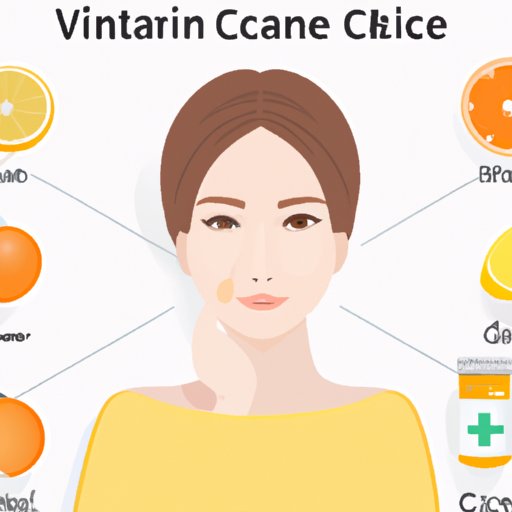
Introduction
There’s a reason vitamin C is often referred to as a “miracle” ingredient in the skincare industry. It has been proven to provide numerous benefits to the skin, leaving it brighter, smoother, and healthier. This essential vitamin is one of the most effective antioxidants, providing protection against free radicals, which can damage the skin cells. In this article, we’ll explore the power and benefits of vitamin C on the skin and how to incorporate it into your daily routine.
The Power of Vitamin C on Your Skin: Why It’s a Must-Have Ingredient in Your Skincare Routine
Vitamin C, also known as ascorbic acid, is a water-soluble vitamin that plays a crucial role in maintaining skin health. It helps to produce collagen, which is essential in keeping the skin firm and elastic. Collagen production decreases with age, leading to wrinkles and fine lines. Vitamin C also helps to reduce inflammation, lighten hyperpigmentation, and protect against environmental stressors like pollution and UV rays.
The benefits of using vitamin C in skincare products are undeniable. It’s a versatile ingredient that suits all skin types, from sensitive to oily. Vitamin C can brighten dull skin, reduce the appearance of dark spots, and prevent the signs of aging. It can also help to heal acne scars and promote wound healing due to its anti-inflammatory properties. However, not all vitamin C skincare products are created equal, and it’s crucial to determine the right concentration and when to use it.
How Vitamin C Can Transform Your Skin Care Routine: Advantages, Usage Tips, and Best Products
Vitamin C is a potent ingredient that can transform your skin texture, tone, and radiance. It’s best to use vitamin C serum after cleansing and toning your skin in the morning. Apply a small amount of serum to your face and neck, and let it absorb into your skin before applying moisturizer and sunscreen. It’s essential to avoid using vitamin C with retinol at the same time to prevent irritation.
When choosing vitamin C skincare products, look for ones that contain L-ascorbic acid, which is the most effective form of vitamin C. The percentage of the vitamin C concentration should range between 10-20% to reap the most benefits. Some of the best vitamin C skincare products in the market include Skinceuticals C E Ferulic Serum, Drunk Elephant C-Firma Day Serum, and Ole Henriksen Truth Serum.
The Benefits of Topical Vitamin C for Glowing Skin: Results, Research, and Recommendations
Scientific research has proven the effectiveness of vitamin C on the skin. A study published in the Journal of the American Academy of Dermatology concluded that topical application of vitamin C led to a significant decrease in fine lines, wrinkles, and hyperpigmentation. Other clinical studies have also shown that vitamin C can increase collagen synthesis, protect against sun damage, and improve skin hydration.
Customer reviews have also raved about the benefits of using vitamin C in their daily skincare routine. Many have attributed their glowing skin to the use of vitamin C, with significant improvements in skin texture, brightness, and overall health. Some of the best topical vitamin C products for different skin types include La Roche Posay Redermic C for sensitive skin, Sunday Riley C.E.O. Rapid Flash Brightening Serum for dry skin, and SkinCeuticals Phloretin CF Gel for oily skin.
The Art of Vitamin C for Your Skin: Natural Sources, Types, and Dosages for Maximum Benefits
Vitamin C is also available from natural sources, and incorporating them into your diet can boost your skin health. Fruits like oranges, kiwifruit, guava, and strawberries are excellent sources of vitamin C. Vegetables like broccoli, kale, and bell peppers also contain high amounts of vitamin C. Eating a diet rich in vitamin C can help to improve skin texture, prevent age-related damage, and provide an overall healthy glow.
There are multiple types of vitamin C used in skincare products, including L-ascorbic acid, ascorbyl palmitate, and magnesium ascorbyl phosphate. L-ascorbic acid is the most effective and stable form of vitamin C. However, other forms of vitamin C can also provide some benefits to the skin. The correct dosage of vitamin C varies depending on your skin type. A concentration of 10-20% is suitable for most people. However, people with sensitive skin can use a lower concentration of vitamin C to prevent irritation.
Why Vitamin C Is Essential for Healthy, Young-Looking Skin: Science, Myths, and Best Practices
There are many myths surrounding the use of vitamin C in skincare routine. Some people believe that vitamin C can cause skin irritation, is only beneficial for mature skin, and is ineffective in treating acne. However, these myths are untrue. Vitamin C is safe and non-irritating, suits all skin types, and can help to prevent and heal acne scars.
The science behind vitamin C’s benefits on the skin is complex. Vitamin C works by neutralizing free radicals and preventing damage to the skin cells. Vitamin C also helps to stimulate collagen production, which keeps the skin firm and elastic. It also helps to reduce inflammation and brighten the skin.
The best practices for incorporating vitamin C into your daily routine include using vitamin C serum in the morning after cleansing and toning, following up with a moisturizer and sunscreen, and avoiding using it with retinol at the same time. It’s crucial to determine the right concentration of vitamin C for your skin type and incorporating vitamin C-rich foods in your diet for maximum benefits.
Conclusion
Vitamin C is an essential ingredient in the skincare routine. It provides numerous benefits to the skin, including reducing fine lines and wrinkles, brightening dull skin, and protecting against environmental stressors. The correct concentration of vitamin C and usage tips are crucial for reaping the maximum benefits. Incorporating vitamin C-rich foods in your diet and selecting the right vitamin C skincare products can also provide significant benefits. Don’t underestimate the power of vitamin C in providing healthy, glowing skin.





